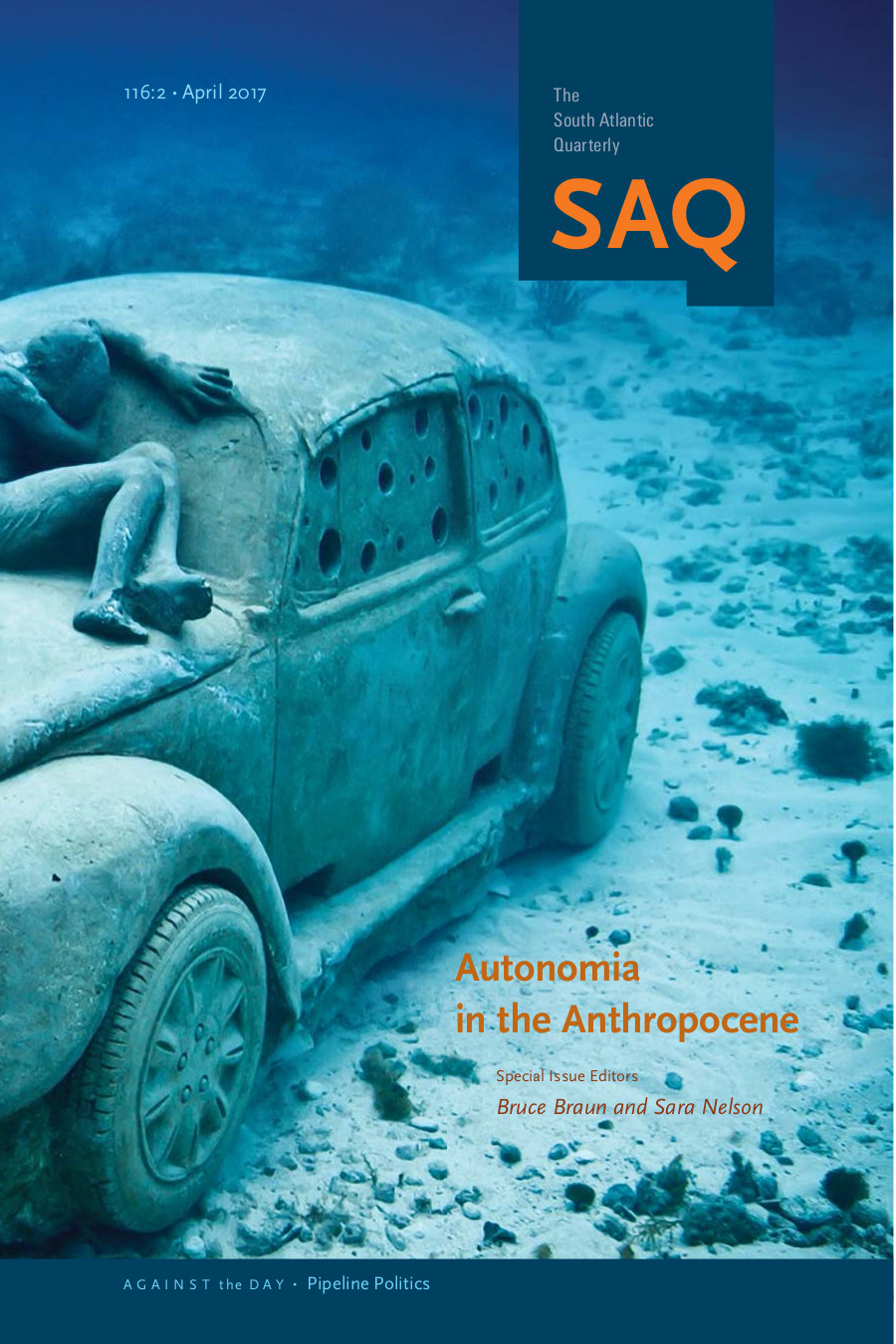South Atlantic Quarterly, 116(2): Autonomia in the Anthropocene (2017)
Filed under journal | Tags: · anthropocene, autonomy, capitalism, cognitive capitalism, commons, labour, marxism, multitude, subjectivity

“Despite Autonomia’s widespread influence on political action and post-Marxist scholarship, it has been surprisingly slow to address planetary change and environmental politics. With a focus on cognitive capitalism, many autonomist scholars have downplayed or fully ignored the ecological dimensions of post-Fordism—its foundations in extractive energy economies, its links to the accelerating financialization of nature under the banner of so-called green capitalism, its harnessing of nonhuman capacities, and its wildly uneven toxic geographies. This lack of engagement is regrettable given that, we propose, autonomist insights hold great promise for understanding both the transformed relation between capital and nonhuman natures in post-Fordism and the many political movements that have emerged in response. […]
It is no longer evident that key terms found in the autonomist lexicon—species being, the common, multitude, potentia—survive the challenge of the Anthropocene unchanged or that the production of subjectivity (a cornerstone of autonomist thought) can be understood solely in terms of language, habit, or gesture. It may therefore be necessary to think beyond the struggles of the factory floor, or those of the cognitariat today, to imagine and think from other sites of struggle, other forms of solidarity, and other experiments in “commoning.” These bring into play unfamiliar actors and unacknowledged geographies: sites of extraction and circuits of waste, indigenous communities and territories, rising seas and toxic landscapes that are materially present within the informationalized economies of global capitalism, but often invisible to those working within them. We might say, then, that the Anthropocene names autonomist Marxism’s unthought, an unthought that intrudes on its political imaginaries. What happens to autonomism if it begins to question the autonomy of the human? Or if it leaves its privileged sites in the global North?”
With contributions by Sara Nelson and Bruce Braun, Miriam Tola, Jason Read, Elizabeth R. Johnson, Elizabeth A. Povinelli, Matteo Pasquinelli, Karen Pinkus, Marco Armiero and Massimo De Angelis, Anja Kanngieser and Nicholas Beuret, and Isabelle Stengers.
Edited by Sara Nelson and Bruce Braun
Publisher Duke University Press, Apr 2017
ISSN 0038-2876
178 pages
Michael Hardt, Antonio Negri: Assembly (2017)
Filed under book | Tags: · activism, assembly, autonomy, colonialism, commons, democracy, entrepreneurship, finance, labour, multitude, neoliberalism, organization, politics, protest, social movements, subjectivity

“In recent years ‘leaderless’ social movements have proliferated around the globe, from North Africa and the Middle East to Europe, the Americas, and East Asia. Some of these movements have led to impressive gains: the toppling of authoritarian leaders, the furthering of progressive policy, and checks on repressive state forces. They have also been, at times, derided by journalists and political analysts as disorganized and ineffectual, or suppressed by disoriented and perplexed police forces and governments who fail to effectively engage them. Activists, too, struggle to harness the potential of these horizontal movements. Why have the movements, which address the needs and desires of so many, not been able to achieve lasting change and create a new, more democratic and just society? Some people assume that if only social movements could find new leaders they would return to their earlier glory. Where, they ask, are the new Martin Luther Kings, Rudi Dutschkes, and Stephen Bikos?
With the rise of right-wing political parties in many countries, the question of how to organize democratically and effectively has become increasingly urgent. Although today’s leaderless political organizations are not sufficient, a return to traditional, centralized forms of political leadership is neither desirable nor possible. Instead, as Michael Hardt and Antonio Negri argue, familiar roles must be reversed: leaders should be responsible for short-term, tactical action, but it is the multitude that must drive strategy. In other words, if these new social movements are to achieve meaningful revolution, they must invent effective modes of assembly and decision-making structures that rely on the broadest democratic base. Drawing on ideas developed through their well-known Empire trilogy, Hardt and Negri have produced, in Assembly, a timely proposal for how current large-scale horizontal movements can develop the capacities for political strategy and decision-making to effect lasting and democratic change. We have not yet seen what is possible when the multitude assembles.”
Publisher Oxford University Press, 2017
Heretical Thought series
ISBN 9780190677961, 0190677961
xxii+346 pages
Reviews: Publishers Weekly (2017), Christian Fuchs (triple-C, 2017).
Comment (0)Benjamin Noys: The Persistence of the Negative: A Critique of Contemporary Continental Theory (2010)
Filed under book | Tags: · accelerationism, affirmationism, capitalism, critique, desire, difference, event, multitude, philosophy, politics, resistance, theory

The Persistence of the Negative offers an original and compelling critique of contemporary Continental theory through a rehabilitation of the negative. Against the usual image of rival thinkers and schools, Benjamin Noys identifies and attacks a shared consensus on the primacy of affirmation and the expelling of the negative that runs through the leading figures of contemporary theory: Jacques Derrida, Gilles Deleuze, Bruno Latour, Antonio Negri, and Alain Badiou.
While positioning the emergence of affirmative theory as a political response to the corrosive effects of contemporary capitalism, Noys argues that, all too often, affirmation is left re-affirming the conditions of the present rather than providing the means to disrupt and resist them.
Refusing to endorse an anti-theory position that would read theory as the symptom of political defeat, The Persistence of the Negative traverses these leading thinkers in a series of lucid readings to reveal the disavowed effects of negativity operating within their work.
Overturning the limits of recent debates on the politics of theory, The Persistence of the Negative vigorously defends the return of theory to its political calling.
Publisher Edinburgh University Press, 2010
ISBN 0748638636, 9780748638635
196 pages
review (Baylee Brits, Parrhesia)
review (Raphael Schlembach, Shift Magazine)

